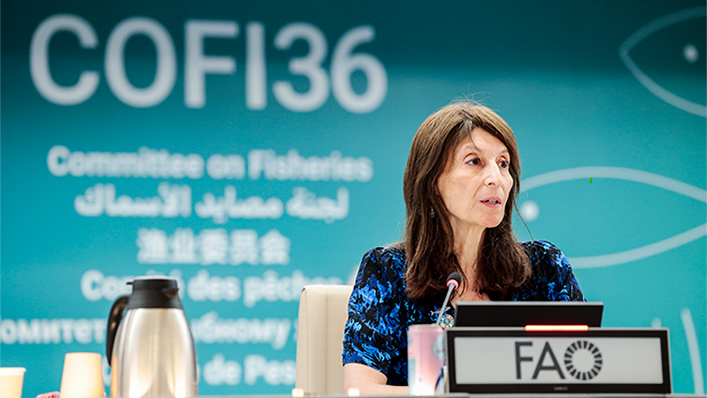
“The sustainability of fisheries is a growing emergency for nations worldwide as the deterioration of fish stocks accelerates unabated. Many millions of people worldwide depend on marine fishing for income, food security, and livelihood. Sustainable management of our ocean resources is therefore essential for our future,” DDG Ellard said.
“The WTO Agreement on Fisheries Subsidies, concluded at the 12th WTO Ministerial Conference in 2022, marks a key milestone in achieving this goal,” she said, noting that this historic deal prohibits the most harmful subsidies affecting the sustainability of global fisheries, namely those to illegal, unreported, and unregulated (IUU) fishing, those concerning overfished stocks, and those to fishing in the unregulated high seas. “However, as you know, our work is not complete. Two critical tasks remain, and we need to tackle them urgently.”
“First, the benefits of the Agreement will be realized only when it enters into force. For this to happen, two-thirds of the WTO membership — or 110 members — must accept the Agreement by depositing their national instruments of ratification in Geneva. While 78 members have done so, we still need 32 more. We aim to hit the required number by the end of the year,” DDG Ellard said. “To those of you who have not deposited, I urge you most earnestly to take this important step promptly. Please mobilize your governments and your legislatures to this end.”
“The second pressing issue is the completion of the ongoing second wave of negotiations, aimed at subsidies contributing to overcapacity and overfishing,” DDG Ellard said. “We came so very close to concluding this work at the 13th WTO Ministerial Conference in Abu Dhabi a few months ago. Many WTO members are very eager to bring this across the finish line. A diverse group of members recently issued a statement in support of concluding these negotiations by the end of this month. Ambassador Einar Gunnarsson of Iceland, who chairs the negotiations, conveyed to members the overwhelming collective will to finalize ‘Fish 2’ by our upcoming General Council meeting in July, although he has noted that some are still sceptical. Work is progressing vigorously in Geneva, and we count on your continued active and constructive participation to achieve this objective,” she added.
DDG Ellard further noted that Article 7 of the Agreement provides for a voluntary financing mechanism to support developing members and least-developed country members of the WTO in implementing the Agreement. The WTO Fish Fund has been established and is in the process of becoming fully operational in time for entry into force of the Agreement. The FAO, together with the World Bank, the International Fund for Agricultural Development (IFAD) and the WTO, are key partners of the Fish Fund.
Her full remarks are available here.
Side event
DDG Ellard elaborated on the WTO Fish Fund at an event held alongside the FAO meeting of the Committee on Fisheries. The webcast is available here.
She said the Fund will offer two main categories of project grants to help developing and LDC members of the WTO implement the Agreement: grants of up to US$ 50,000 to support preliminary activities, like studies and needs assessments; and grants of up to US$ 300,000 for more complex interventions relating to fisheries management, data collection, capacity building and technical assistance, and support for members to update their legislative frameworks as needed.
She also drew attention to the need for members to meet notification requirements under the Agreement on Fisheries Subsidies and the Agreement on Subsidies and Countervailing Measures.
Share
Reach us to explore global export and import deals